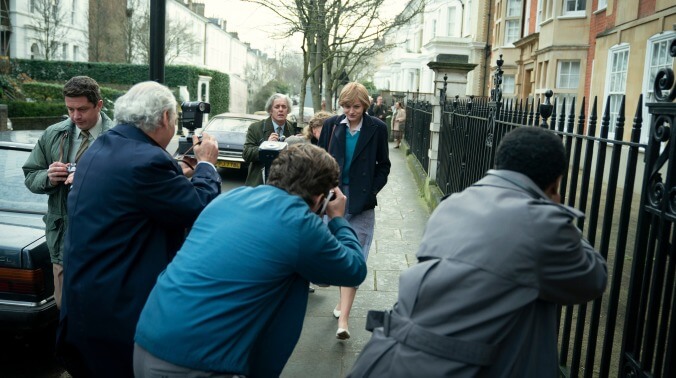“The Balmoral Test” is also deeply revealing when it comes to Margaret Thatcher’s character. While it’s true that she’s faced genuine oppression due to her class and gender, she also has a tendency to calcify her distrust into rigid ideologies. She’s more comfortable having enemies than friends. She writes off her cabinet as patronizing old men when they raise seemingly legitimate concerns about the severity of her budget cuts. And she writes off the royal family as “boorish, snobbish, and rude” rather than finding humor in her strange holiday weekend at Balmoral. In fact, the trip inspires a decisive shift in Thatcher’s thinking. She not only rejects the royals, she rejects the idea that there’s any value in working with anyone from a privileged, entitled background. They “lack grit,” as she puts it after purging the upper class members of her cabinet. Ironically, that’s probably exactly how the royal family would describe Thatcher’s dislike for muddy hunting excursions.
This episode brushes up against all sorts of fascinating tensions and hypocrisies in the shift from traditional conservatism to the more radical 1980s right-wing ideology embodied by the likes of Thatcher and Ronald Reagan. While Thatcher’s cabinet argues that Conservatives stand for the principles of “caution, stability, and moderation,” Thatcher envisions her party as a force for radical fiscal and social change—libertarianism by way of authoritarianism. And that naturally puts her at odds with the Queen. Though Elizabeth is politically neutral, she certainly embodies all the non-political implications of the word “conservative.” It’s her role to be a calm, steady presence throughout the whirlwind of British history—to “paper over the cracks,” as Princess Margaret put it last season. That sets up a fascinating conflict between a Prime Minister who feels it’s her job to shake things up and a Queen whose constitutional duty is to not make waves. Two women who were initially willing to give each other the benefit of the doubt now find themselves at loggerheads.
While Thatcher fails her titular “Balmoral test,” Diana passes hers with flying colors. She’s a self-proclaimed “country girl at heart,” with a fondness for hunting and old-fashioned parlor games that puts her right at home with the royals. Unfortunately, it’s seeing Diana so readily accepted by his family—and by his father in particular—that really puts Charles off her. Like Thatcher, Charles would prefer to define himself in opposition to the old-school traditions his family embodies. And the newness Diana initially represented looks a lot different under the moody lights of Balmoral Castle.
In one of the ultimate examples of self-plagiarism, writer Peter Morgan uses almost the exact same 14-point stag metaphor as he did in his previous seminal Queen Elizabeth text, The Queen—right down to the detail about the commercial guest on another estate. It’s clearly something that resonates deeply with Morgan, although, like Charles, I’m inclined to scoff at the heavy-handedness of the symbolism. (Not to mention the terrible CGI work on the stag.) But the ambiguity of the metaphor is helpful to understanding the ambiguity in Charles and Diana’s relationship.
Charles sees himself as the stag being hunted, shot, and gutted into submission. But the episode’s rather ominous ending suggests it’s actually Diana who’s about to be hung like a trophy in the royal family’s hall. Charles and Diana are both being pressured into a match they’re not entirely sure about simply because their families think they’re perfect for one another. (Well, in a world where a 19-year-old is ever considered a perfect match for a 32-year-old.) And if Thatcher is too quick to put her foot down and burn bridges, Charles and Diana are perhaps too indecisive for their own good. Though neither seems to feel a real spark, they both see too much value in their match to stop it either. Diana’s sly final smile confirms there’s a part of her that wants the fame and glamour of being a princess. And since Charles seems to have accepted that there’s no one he’ll ever love as much as Camilla, he figures he might as well settle for someone who at least makes his family happy.
I’m hoping this season will eventually complicate its uniformly rosy portrait of Charles with something a bit more complex—especially on a show that tends to be more sympathetic to its male characters than its female ones. But for now, “The Balmoral Test” is a fascinating hour in which a lot of people make ill-advised decisions based on understandable motivations. This episode confirms that Diana and Thatcher will both be major point-of-view characters in this change-centric season. Plus it delivers the sort of lush, gloriously staged Scottish visuals that only this series can provide.
Stray observations
- Everything the Windsors get up to at Balmoral Castle is the epitome of “classy if you’re rich, but trashy if you’re poor.”
- One thing Thatcher can’t quite appreciate is that attending the highland games in a ceremonial capacity is a form of work for Elizabeth. Her work might look like leisure, but it’s still work.
- It feels notable that Philip is seated under the head of the last Imperial stag the royal family shot. No one bristles at being seen as a “trophy spouse” more than him.
- I’ve always thought “bank holiday” is a much cuter term than “federal holiday.”
- Between Thatcher quoting a Chartist poet and her husband doing a Prince Albert impression, I feel like Peter Morgan spent his off-season catching up on Victoria.
- “Tippity-toppity, down with the Nazis!”









































